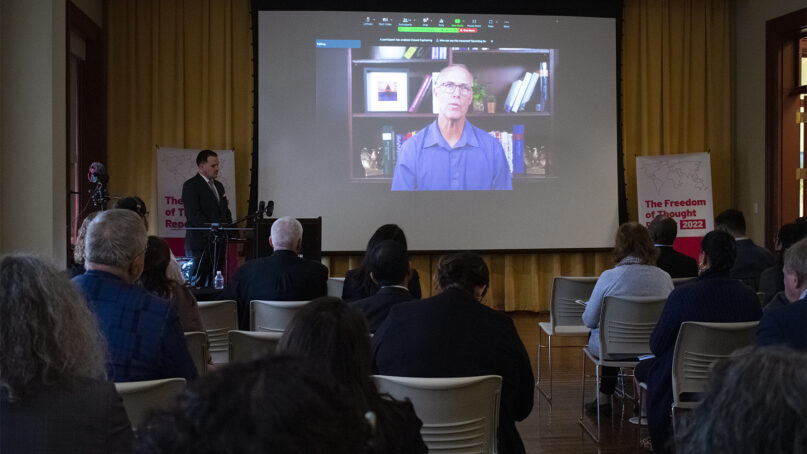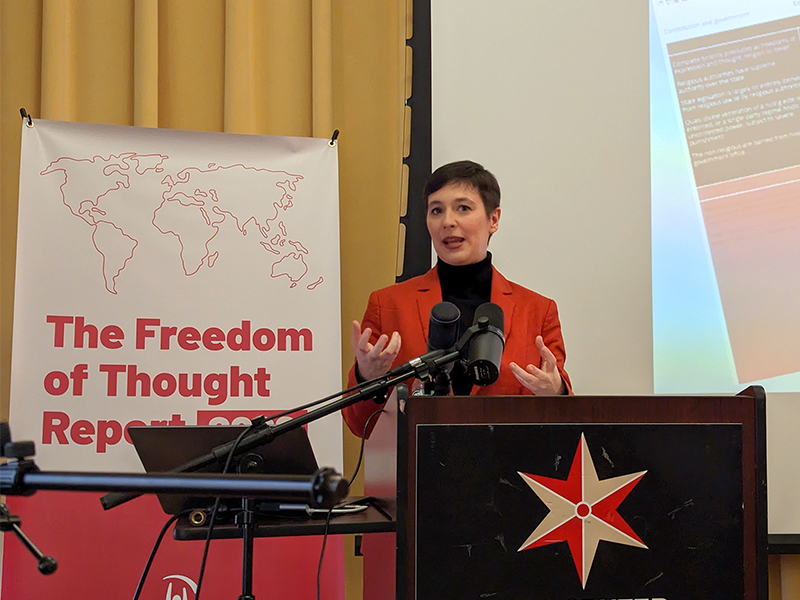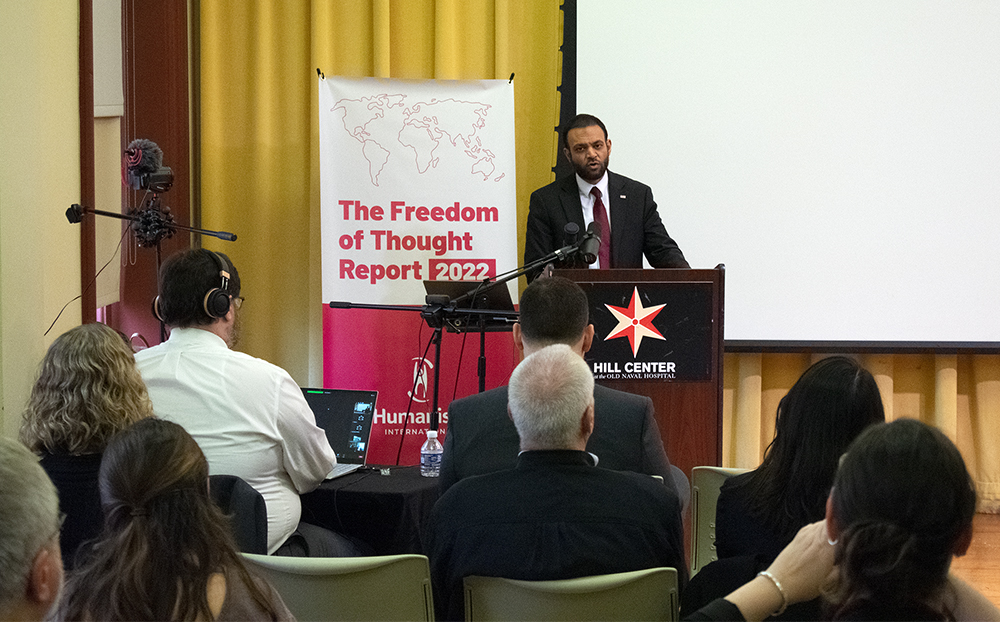US leaders gather to discuss rights of nonreligious people across the world
'Discrimination against the non-religious is often caused, not by a desire to hurt atheists, but by the desire to help one or more religions,' according to a new report by Humanists International.

(RNS) — Religious freedom leaders — including a United States ambassador, commissioner and elected representative — gathered in Washington, D.C., on Thursday (Dec. 8) to shed light on the rights of nonreligious people in countries across the globe.
The convening was part of the launch of the “Freedom of Thought Report” by Humanists International, an annual look at how non-religious individuals — comprising atheists, agnostics, humanists and freethinkers — are treated because of their lack of religion or absence of belief in a god.
It was hosted by American Atheists, a civil rights organization that works to achieve religious equality for all Americans. Among those in attendance were U.S. Rep. Jared Huffman, a congressman for much of California’s Bay Area; U.S. Ambassador-at-Large Rashad Hussain with the Office of International Religious Freedom; and Frederick Davie with the United States Commission on International Religious Freedom.
RELATED: New report finds nonreligious people face stigma and discrimination
To Nick Fish, president of American Atheists, it was meaningful that the Biden-Harris Administration, along with other U.S. leaders and the global human rights community “are recognizing our rights are just as worthy of protection as any other religious or belief groups.”
Emma Wadsworth-Jones, a coordinator for Humanists International who presented the report, underscored that nonreligious people are a distinct category within freedom of religion or belief “who have universal human rights,” which include the right to freedom of religion and belief and to freedom of thought and expression.
“Discrimination against this community is pervasive,” she said.
Wadsworth-Jones underscored that “true secularism is inclusive of all,” adding that “where secularism is upheld … rights tend to be better respected for all.”

Emma Wadsworth-Jones presents Humanists International’s “Freedom of Thought Report,” Thursday, Dec. 8, 2022, in Washington. Photo courtesy of American Atheists
The report — which is in its 11th year — rates all countries and highlights “Key Countries,” where the organization updated the ratings in 2022, and a “Watch List,” which includes countries that Humanists International continues to monitor despite their rating holding steady.
Humanists International creates ratings by focusing on global human rights agreements “that most affect nonreligious people,” such as the right to freedom of thought, conscience, religion or belief and the right to freedom of expression.
Ratings factor in apostasy laws that make it illegal to convert to a religion or declare oneself as nonreligious, as well as blasphemy laws that outlaw criticism of protected religions and religious figures and institutions, according to the report.
The organization also considers family laws that exclude atheists from getting married as well as other laws requiring citizens to identify their religion on state ID cards, forbidding citizens from identifying as atheist or nonreligious.
“Discrimination against the non-religious is often caused, not by a desire to hurt atheists, but by the desire to help one or more religions,” according to the report.
The report found that only 4% of the global population “live in societies that are truly secular, where there is a clear separation of religious and political authorities, that do not discriminate against any religion or belief community.”
Countries like Afghanistan and Iran, which are on the organization’s “Watch List,” were found to have grave violations and poor ratings due to state legislation being largely or entirely derived from religious law or by religious authorities.
RELATED: Confusion over Iran’s religious police as women drop hijab
In Iran, the country’s morality police have triggered months of protests after the death of 22-year-old Mahsa Amini. The report noted that Iran’s government periodically jails and executes dozens of individuals on charges of “enmity against God” (moharebeh).
“Although this crime is framed as a religious offense and may be used against humanists and other religious dissenters, it is most often used as a punishment for political acts that challenge the regime (on the basis that to oppose the theocratic regime is to oppose Allah),” the report reads.
Just as Humanists International launched the report, the Center for Human Rights announced on Thursday that 23-year-old Mohsen Shekari was hung under the charge of “moharebeh,” after he was accused of wounding a paramilitary officer during a protest.
In Pakistan, the country’s legal environment is “notably repressive,” Wadsworth-Jones said, with “oppressive blasphemy laws, impunity for violence on religious grounds and systematic religious discrimination.”
When looking at Barbados, while its constitution declares the state to be secular, “symbolic trappings of state religion remain,” Wadsworth-Jones said. The preamble to its constitution, for example, states that the people of Barbados “acknowledge the supremacy of God,” she said.
In France, where secularism is a fundamental principle of the state, Wadsworth-Jones noted that strict enforcement of such principles has been criticized “for leading to discrimination against religion or belief minorities by limiting their freedom of worship.” Discrimination against Muslims in France has increased in recent years, particularly after the 2015 terrorist attacks and during COVID-19, she said.

U.S. Ambassador-at-Large Rashad Hussain speaks at a meeting about the rights of nonreligious people, Thursday, Dec. 8, 2022, in Washington. Photo courtesy of American Atheists
The United States received a relatively good rating due to “strong constitutional protections in favor of freedom of thought, religion or belief.”
It remains on the “Watch List” because, according to the report, those freedoms mixed with Christian conservatism and a wealthy Christian right lobby, “means that secular, humanist and civil liberties groups find themselves facing a battle to preserve the inherent secularism of the constitution.”
RELATED: Major Christian leaders asked Jan. 6 committee to investigate Christian nationalism
This threat to secularism “gained a greater foothold” under the presidency and influence of Donald Trump, resulting in the Supreme Court decision to overturn Roe and the federal right to an abortion, according to the report.
“Extremism and religion continue to pose a severe threat to our democracy,” said Huffman, who identifies as a humanist, adding that white Christian nationalist groups “continue to export their dangerous, violent ideology and to find more traction in the mainstream.”
“My colleagues are feeling more confident in calling out the threat of white Christian nationalism directly,” he said.
Huffman, who helped establish the Congressional Freethought Caucus, highlighted a bipartisan resolution passed by the House of Representatives last year that condemns “heresy, blasphemy and apostasy laws.”
RELATED: California congressman demands more transparency from health care sharing ministries
He also noted legislation he introduced that would require health care sharing ministries to disclose a range of information to federal agencies.
Hussain, with the Office of International Religious Freedom, spoke about Nigerian humanist and atheist Mubarak Bala, who was sentenced to more than 20 years in prison “following accusations he had committed blasphemy against Islam and Muslims,” he said.
Bala was arrested in 2020 and formally charged in 2021 “for causing a public disturbance by posting ‘blasphemous’ content.”
Early this month, the USCIRF called out the U.S. Department of State after it failed to include Nigeria or India in its latest designations of “Countries of Particular Concern.”
“Governments do not only weaponize blasphemy laws against humanists and atheists, they use them against Christians, Muslims and many more,” Hussain said.
The report highlighted that “any rights violations and discrimination are important, even when only small numbers of people are affected,” adding that “the non-religious are not a small group.”
It cited findings from the 2012 WIN-Gallup International Association showing that atheism and the non-religious population have grown rapidly, with religion dropping by 9 percentage points and atheism rising by 3 percentage points between 2005 and 2012.
This story has been updated.
No comments:
Post a Comment